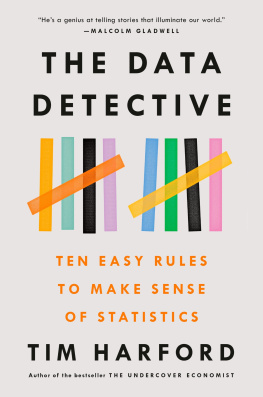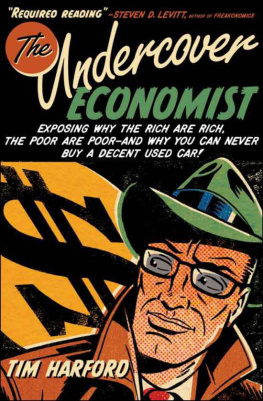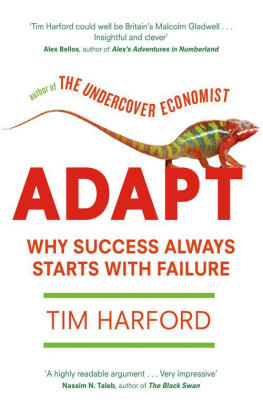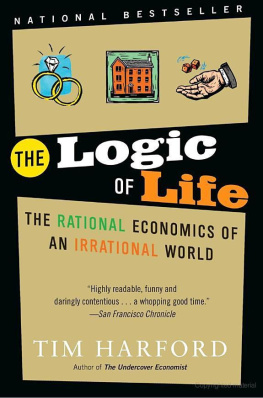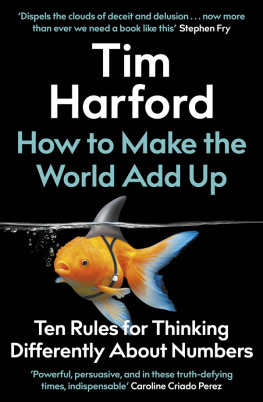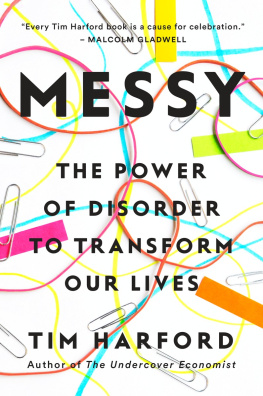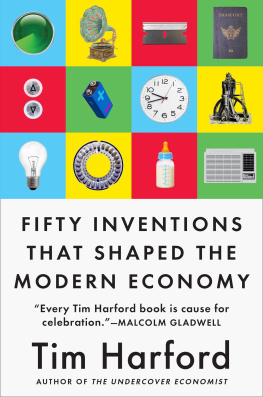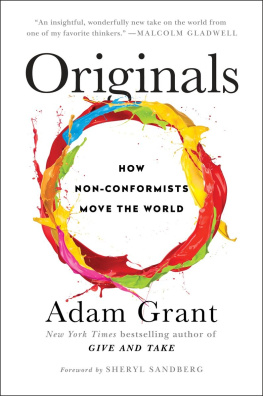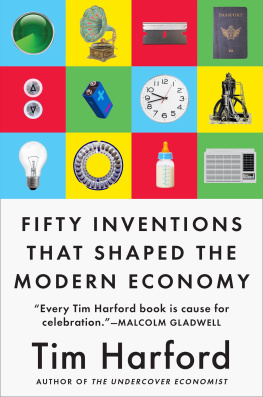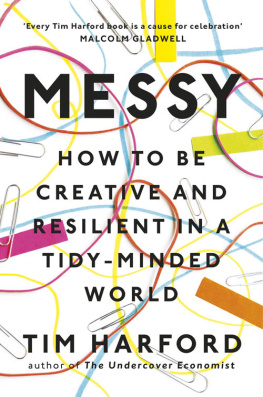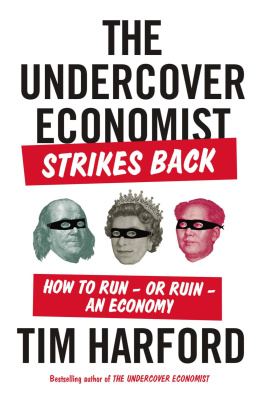
R IVERHEAD B OOKS
An imprint of Penguin Random House LLC
375 Hudson Street
New York, New York 10014

Copyright 2016 by Tim Harford
Penguin supports copyright. Copyright fuels creativity, encourages diverse voices, promotes free speech, and creates a vibrant culture. Thank you for buying an authorized edition of this book and for complying with copyright laws by not reproducing, scanning, or distributing any part of it in any form without permission. You are supporting writers and allowing Penguin to continue to publish books for every reader.
eBook ISBN 9780698408906
While the author has made every effort to provide accurate Internet addresses at the time of publication, neither the publisher nor the author assumes any responsibility for errors, or for changes that occur after publication. Further, the publisher does not have any control over and does not assume any responsibility for author or third-party websites or their content.
Version_1
To Stella, Africa, and Herbiemasters of mess
Contents
Introduction
It was unplayable.
O n the 27th of January, 1975, a seventeen-year-old German girl named Vera Brandes stepped out onto the vast stage of the Cologne opera house. The auditorium was empty, and lit only by the dim green glow of the emergency exit sign, but this was the most exciting day of Veras life. She was the youngest concert promoter in Germany, and she had persuaded the Opera House to host a late-night concert of improvised jazz by the American pianist Keith Jarrett. The concert was a sellout, and in just a few hours, Jarrett would stride out in front of 1,400 people, sit down at the Bsendorfer piano, and without sheet music or rehearsal would begin to play.
But that afternoon, Vera Brandes was introducing Keith Jarrett and his producer Manfred Eicher to the pianoand it wasnt going well.
Keith played a few notes, recalls Brandes. Then Eicher played a few notes. They didnt say anything. They circled the instrument several times and then tried a few keys. Then after a long silence, Manfred came to me and said, If you dont get another piano, Keith cant play tonight.
Vera Brandes was stunned. She knew that Jarrett had requested a specific instrument and the Opera House had agreed to provide it. What she hadnt realized was that, caring little for late-night jazz, theyd failed and didnt even know it. The administrative staff had gone home, the piano movers hadnt been able to find the Bsendorfer piano that had been requested, and so they had instead installed, as Brandes recalls, this tiny little Bsendorfer, that was completely out of tune, the black notes in the middle didnt work, the pedals stuck. It was unplayable.
Brandes tried everything to find a replacement. She even rounded up friends to push a grand piano through the streets of Cologne, but it was raining hard, and the local piano tuner warned her that the substitute piano would never survive the trip. Instead, he worked to fix up the little instrument that was onstage already. Yet he could do nothing about the muffled bass notes, the plinky high notes, and the simple fact that the pianoa small piano, like half a pianojust didnt make a loud enough sound to reach the balconies of the vast auditorium.
Understandably, Jarrett didnt want to perform. He left and went to wait in his car, leaving Brandes to anticipate the arrival of 1,400 soon-to-be furious concertgoers. The best day of her life had suddenly become the worst; her enthusiasm for jazz and her precocious entrepreneurial spirit brought the prospect of utter humiliation. Desperate, she caught up with Jarrett and through the window of his car, she begged him to play. The young pianist looked out at the bedraggled German teenager standing in the rain and took pity on her. Never forget, Jarrett said. Only for you.
A few hours later, as midnight approached, Jarrett walked out to the unplayable piano in front of a packed concert hall, and began.
The minute he played the first note, everybody knew this was magic, recalls Brandes.
That nights performance began with a simple chiming series of notes, then quickly gained complexity as it moved by turns between dynamism and a languid, soothing tone. It was beautiful and strange, and it is enormously popular: the Kln Concert album has sold 3.5 million copies. No other solo jazz album or solo piano album has matched that.
When we see skilled performers succeeding in difficult circumstances, we habitually describe them as having triumphed over adversity, or despite the odds. But thats not always the right perspective. Jarrett didnt produce a good concert in trying times. He produced the performance of a lifetime, but the shortcomings of the piano actually helped him.
The substandard instrument forced Jarrett away from the tinny high notes and into the middle register. His left hand produced rumbling, repetitive bass riffs as a way of covering up the pianos lack of resonance. Both of these elements gave the performance an almost trancelike quality. That might have faded into wallpaper music, but Jarrett couldnt drop anchor in that comfortable musical harbor, because the piano simply wasnt loud enough.
Whats important to understand is the proportion between the instrument and the magnitude of the hall, recalls Vera Brandes. Jarrett really had to play that piano very hard to get enough volume to get to the balconies. He was reallypchowpushing the notes down.
Standing up, sitting down, moaning, writhing, Jarrett didnt hold back in any way as he pummeled the unplayable piano to produce something unique. It wasnt the music that he ever imagined playing. But handed a mess, Keith Jarrett embraced it, and soared.
K eith Jarretts instinct was not to play, and its an instinct that most of us would share. We dont want to work with bad tools, especially when the stakes are so high. But in hindsight, Jarretts instinct was wrong. What if our own similar instincts are also wrong, and in a much wider range of situations?
The argument of this book is that we often succumb to the temptation of a tidy-minded approach when we would be better served by embracing a degree of mess. Keith Jarretts desire for a perfect piano was one example of this tidiness temptation. Others include the public speaker who cleaves to a script; the military commander who carefully strategizes; the writer who blocks out distractions; the politician who sets quantifiable targets for public services; the boss who insists on tidy desks for all; the team leader who makes sure everyone gets along. We succumb to the tidiness temptation in our daily lives when we spend time archiving our e-mails, filling in questionnaires on dating websites that promise to find our perfect match, or taking our kids to the local playground instead of letting them run loose in the neighborhood wasteland.
Sometimes, of course, our desire for tidinessour seemingly innate urge to create a world that is ordered, systematized, quantified, neatly structured into clear categories, planned, predictablecan be helpful. It wouldnt be such a deeply rooted instinct if it werent helpful.
But often we are so seduced by the blandishments of tidiness that we fail to appreciate the virtues of the messythe untidy, unquantified, uncoordinated, improvised, imperfect, incoherent, crude, cluttered, random, ambiguous, vague, difficult, diverse, or even dirty. The scripted speech misreads the energy of the room; the careful commander is disoriented by a more impetuous opponent; the writer is serendipitously inspired by a random distraction; the quantified targets create perverse incentives; the workers in the tidy office feel helpless and demotivated; a disruptive outsider aggravates the team but brings a fresh new insight. The worker with the messy inbox ultimately gets more done; we find a soul mate when we ignore the website questionnaires; the kids running loose in the wasteland not only have more fun and learn more skills, butcounterintuitivelyhave fewer accidents.


